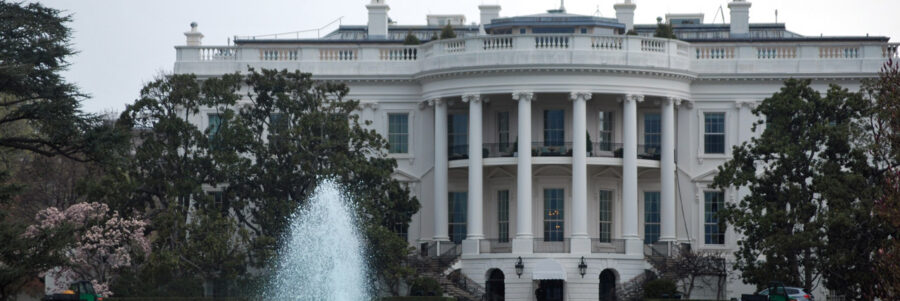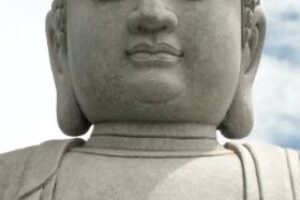
POTUS IGNORAMUS
If you were expecting to read yet another political screed against (or in favor of) the current occupant of the White House, please forgive me if the title seems to imply that. This piece will attempt to tread the rarefied turf of the Middle Way, anathema to partisan polarization.
Personally, I tend to sympathize (empathize?) with liberal-progressive values on social and fiscal issues, which seem consonant with most interpretations of the Buddhist principle of compassion for others. But politically, I claim to be “registered interdependent.”
One of the first steps toward meeting in the middle is to examine the labels at the extremes. “Liberals” want to conserve certain things, such as the Bill of Rights. “Conservatives” want to liberalize certain other things, notably government regulations governing capitalist enterprise. In other words, everyone is both liberal and conservative. The salient difference lies in what it is, exactly, that they want to conserve, or to liberalize.
The theory is that if we can fully define a given problem, the effective solution will be inherent in that definition.
taiun michael elliston, roshi
The acronym POTUS hopefully needs no definition for anyone paying attention. My laptop’s onboard dictionary defines ignoramus as:
ignoramus | ˌiɡnəˈrāməs, ˌiɡnəˈraməs | noun
(plural ignoramuses)
an ignorant or stupid person.
ORIGIN late 16th century (as the indorsement made by a grand jury on an indictment considered backed by insufficient evidence to bring before a petty jury): Latin, literally ‘we do not know’ (in legal use ‘we take no notice of it’), from ignorare (see ignore).
The current political circus has led some pundits to opine that we may indeed have discovered a completely new species — a potus that is a complete ignoramus. But a cursory review of the history of the presidency will cure you of that ignorant opinion, suggesting that we are wiser to use the plural form. No one can claim not to be an ignoramus in some sense of the word: we are all ignorant of something. And if we are honest with ourselves, we are vastly more ignorant, than not. That is, what we know — or can know — is dwarfed by what we do not — or cannot — know. Then again, there is the matter of willful ignorance, over and against the innocent variety. We are all born not knowing, but we are responsible for what we choose to ignore.
An ignorant person is not the same as a stupid person. As they say, you can’t fix stupid. If we are merely ignorant, we have the opportunity of overcoming that deficit through research, study and practice. If we are stupid, it means we cannot learn, or stubbornly refuse to learn the inconvenient truths we would rather ignore.
The long Ch’an poem, Hsinhsinming, the first and earliest teaching from China’s lineage chanted in the Soto Zen liturgy, closes with the stanza:
Ministers serve their lords
Children obey their parents
Not obeying is not filial
Failure to serve is no help
With practice hidden function secretly
Like a fool like an idiot
Just to continue in this way is called
The host within the host
The obvious influence of Confucianism emphasizes the practical application to living as a lay person, while nurturing an internal practice, in the society of the time. This is as central an issue for modern followers of Zen as it was in the time of Sengcan, the 3rd ancestor in China. Today we are all struggling with the extreme contrast of the potential we are capable of realizing internally, with the dismal external reality we witness on a daily basis. This is the truly pitiful awareness that all practitioners, from Buddha on down, have come to. Disorientation sets in, based on the intuition that we are awake to the terrible level and degree of suffering, based on ignorance, that everyone else seems to be experiencing, even though they seem to think that they are enjoying life. It is as if something goes terribly awry between the transition from potential energy to its manifestation as kinetic energy.
But this poem introduces further terms that need clarification along with ignoramus: fool, and idiot. Again from the Apple e-dictionary:
idiot | ˈidēət | noun informal
a stupid person. • archaic a mentally handicapped person.
ORIGIN Middle English (denoting a person of low intelligence): via Old French from Latin idiota ‘ignorant person’, from Greek idiōtēs ‘private person, layman, ignorant person’, from idios ‘own, private’.
And this commentary from Wikipedia:
Many political commentators, starting as early as 1856, have interpreted the word “idiot” as reflecting the Ancient Greeks’ attitudes to civic participation and private life, combining the ancient meaning of ‘private citizen’ with the modern meaning ‘fool’ to conclude that the Greeks used the word to say that it is selfish and foolish not to participate in public life.
All three terms — ignoramus, fool, and idiot — have in common that each can be interpreted (and lobbed at a political opponent) as a pejorative (“a word expressing contempt or disapproval”), but each may also be interpreted in a neutral, even relatively positive, and approving way.
But being ignorant is not a fault, necessarily, but merely an inherent trait. According to Buddhism’s Twelvefold Chain of Interdependent Origination, primordial ignorance is the first link in the chain — the inchoate cause, and a continuing condition, of existence itself.
But this perspective provides no excuse for willful ignorance, especially for those in positions of power. “We are all God’s fools” is another expression of the innocence of our native condition.
Likewise, an “idiot” is, originally, simply someone who, like a child, is out of touch with the norms of society, and incapable of living up to the expectations of performance within those norms. Or unwilling to embrace the assumptions, cultural memes, compromises and pomposity required of a “public person” as opposed to the anonymity and freedom of the “private person.” Many famous Zen masters would have qualified. They tended to “keep their light under a bushel.”
The “host and guest” analogy is one of many models of the dualistic nature of consciousness that our Zen ancestors have conjured, as a way of leading their students by the hand, safely across the ocean of Samsara (this one attributed to Master Rinzai – C. Linchi). Here, there is no ignorance of the willful kind, but only the profound ignorance of the “don’t-know mind.” The guest is long gone, though it may be recalled; and the host has been subsumed into the nondual reality, where even the host cannot be considered to be alone. Note that the literal Latin interpretation of ignoramus is “we do not know.” This is about as close as you can get to the Original Mind. The host-within-the-host is the “most intimate” — that “inmost consciousness” Buddha refers to in the Surangama Sutra.
Re-entering the market place of the political campaign from his standpoint, we can see clearly what is missing, and that the real solution to society’s problems is not to be realized by political means alone. Egregious ignorance cannot be overcome by another version of petty ignorance, from the polar position, at least not for very long. As long as the individuals involved are unable, or unwilling, to confront their own ignorance with humility in that inmost realm, the outer manifestations will continue to revert to willful ignorance, as surely as day returns to night. Only when we get off the planet, and look back from outer space, can we see that day and night are not-two.
Functioning secretly means that whatever the political memes of the day, we keep our eyes closely on the real prize — which is not political, but personal, salvation. Of course, it makes a difference who we vote for and how we vote, especially in a pandemic, exacerbated by panic, brought on by rampant rapaciousness of both the viral and human kind. But a reality check reveals that from the late 1700s into the 1800s, the percentage of the US population that voted creeped upward from less than 5% to 15%, and by the time I was born in the 1940s had surged past 35%, partly owing to suffrage being extended to disenfranchised groups, but by 2012, in spite of all the advances in communications technology, had failed to reach even 45%. Clearly a major issue is that some of the vote is being suppressed or otherwise uncounted, primarily owing to gerrymandering and the electoral college. But if less than half of eligible people actually vote, then the real problem lies deeper.
I do not mean to suggest, or even imply, that I have any real solution in mind. In design training, we learn that the definition of the problem is where we focus our attention, rather than attempting to leapfrog to a solution. The theory is that if we can fully define a given problem, the effective solution will be inherent in that definition.
What is the thoroughgoing and complete definition of this particular problem? I leave it to you to work through it, though I am happy to discuss it with you. I believe any solution will be different for each individual, but that as members of a collaborative community, we can help each other to see it more fully. Individually, we have the unique method of zazen, to sort through the clutter and confusion on the cushion. Collectively, we have the kind speech technique of dialog (as opposed to “debate,” as it has been debased in the current culture). Let us get on with it together.
09SEP2020DB









